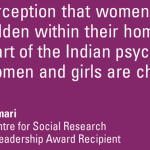As a 21 year old, white, female travelling the world solo, I have always considered myself to be an adventurous and strong-willed individual. When the opportunity to go on an internship to Delhi, India for 6 weeks cropped up, I jumped at the opportunity. I was successful in obtaining one of the internship places. I thought that my family would share in my excitement. Instead they shared links to horror news stories with gory headlines outlining the rapes and assaults that were bound to occur to my body just for entering this land. Now, I do not mean to claim that these atrocities to do not exist, they do. However I was taught to believe that because of my female body and whiteness I would be the prime target. It is a very odd feeling knowing that your family does not support you, when in previous endeavors they were also your best cheerleaders – or were they?
The couple weeks leading up to the trip, I was petrified, the Canadian media’s interpretation of Delhi and its villainous aura had penetrated my mind and there were no images prevalent to offer a contradiction to these socialized thoughts. My gender literally embodied my supposed persecution in this new place. I had never thought of my gender so much prior to this trip. In Canada, especially at Queen’s University, it was easy to theorize the socialized aspects of gender we are all to accept. However, it is a completely different feeling to feel outright marked by your gender and nothing else.
Gender by all ideals is a social construct that has universal and local meanings. Gender is arguably one of the most powerful social constructs as it informs the ways we “must/should/could/would” behave and if we depart from the “norms” we have to be categorized as one of those aberrations that transgress these definitive boundaries arbitrarily constructed. I have never thought so much about ticking a box to define myself as male or female, as I did when I filled out my Indian visa that offered a third option: transgender. Canada supposes itself as a highly liberal and progressive country, but on no official documentation are individuals able to declare themselves transgender, they must conform to a binary of male or female – their gender must define them.
Throughout these past four weeks I have become further enlightened on the struggles girls within India must face at a much higher rate than their male counterpart. The lack of emphasis for girls to be educated is something I “knew” about in my studies, but never something I had seen. To me, it seemed incredulous that someone would keep their child from learning, but then I really thought about it and found some similarities in the Canadian context. Yes, there is no outright mindset that girls should not be educated, but there is a mindset that their education is secondary to that of their male counterparts. Girls go to school to finish their degree and get a husband. The husband is the breadwinner and the girl should be happy to stay home and raise the children – her education and career come secondary to that of the family. Gender constructs your narrative before you are given the chance to combat it. Women who choose to put their career first are constructed, as selfish women who must have something wrong with them to still be single at their age.
Gender in India plays a huge role in defining how interactions are to happen. I have noticed that most people would rather talk to my colleague over me, as he identifies as a male. I have slowly taken up a more self-conscious and quiet role, which is in stark opposition to what I would like to consider my regular disposition. None of these non-interactions have been out of malice, but rather out of habit. Even when the interaction was with a woman she generally chose to talk to my partner over me to explain our tasks or how to get to our new destination. Now, part of this may stem from the fact that he speaks a little Hindi and is Indian, but even if I initiated the conversation my colleague soon replaced me.
My whiteness combined with my femininity did not help me to blend in to any situation. One particular anecdote is when my colleague and I went on a raid with a different NGO and I was partnered up with the only other female on the raid. On this raid I stood out like a sore thumb and was eventually told to go sit in a car with a 3 male police officer detail, as apparently there was talk about kidnapping me. In the car, the police did not allow me out because a mob was growing and they were fearful what could happen to me. I had never previously felt like my gender and skin colour restricted my movements until that moment. I became more aware of my gender and its collusion with my skin colour to ensure I always stood out.
It will be a strange feeling to return to Canada and to be just as hyper-vigilant about my gender and its lived reality through my body through my socialization of how to act when abroad. Upon returning to Canada, I think I will notice a lot of similarities between its treatment of girls and India’s treatment of girls. I think the issue of females as a subservient gender is a universal issue that needs to be addressed urgently.


Looking forward to reading your blogs, you can mail us your entries at WriteWithUs@csrindia.org, or upload them at Write With Us.
Donation for Centre for Social Research to Join our effort in rehabilitating Domestic Violence
Discuss this article on Facebook




